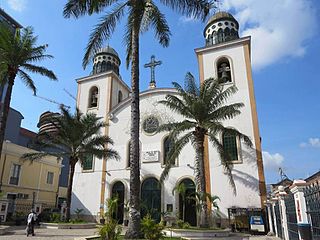Related Research Articles

Brazilian literature is the literature written in the Portuguese language by Brazilians or in Brazil, including works written prior to the country's independence in 1822. Throughout its early years, literature from Brazil followed the literary trends of Portugal, whereas gradually shifting to a different and authentic writing style in the course of the 19th and 20th centuries, in the search for truly Brazilian themes and use of Brazilian forms.

Eugénio de Paula Tavares was a Cape Verdean poet. He is known through his famous poems (mornas), mostly written in the Creole of Brava.

João Baptista da Silva Leitão de Almeida Garrett, 1st Viscount of Almeida Garrett was a Portuguese poet, orator, playwright, novelist, journalist, politician, and a peer of the realm. A major promoter of theater in Portugal he is considered the greatest figure of Portuguese Romanticism and a true revolutionary and humanist. He proposed the construction of the D. Maria II National Theatre and the creation of the Conservatory of Dramatic Art.
Menezes, sometimes Meneses, was originally a Portuguese toponymic surname which originated in Montes Torozos, a region in Tierra de Campos, northeast of Valladolid and southeast of Palencia. The ancestor of the Meneses lineage was Tello Pérez de Meneses. The family wealth and power grew remarkably in the 13th and 14th centuries, through several marriages with the Castilian and Portuguese royal families.

Claridade was a literary review inaugurated in 1936 in the city of Mindelo on the island of São Vicente, Cape Verde. It was part of a movement of cultural, social, and political emancipations of the Cape Verdean society. The founding contributors were Manuel Lopes, Baltasar Lopes da Silva, who used the poetic pseudonym of Osvaldo Alcântara, and Jorge Barbosa, born in the Islands of São Nicolau, Santiago and São Vicente, respectively. The magazine followed the steps of the Portuguese neorealist writers, and contributed to the building of "Cape Verdeanity", an autonomous cultural identity for the archipelago.
José Gomes Ferreira, GOSE, GOL was a Portuguese poet and fiction writer with a vast work of varied influences. Gomes Ferreira was also a political activist that participated in the resistance against the dictatorship of Oliveira Salazar, becoming later a member of the Portuguese Communist Party. In the late 1970s he occupied the presidency of the Portuguese Writers Association.
Ana Paula Ribeiro Tavares is an Angolan poet.
Portuguese poetry refers to diverse kinds of poetic writings produced in Portuguese. The article covers historical accounts of poetry from other countries where Portuguese or variations of the language are spoken. The article covers Portuguese poetry produced from the Middle Ages to the present era.

Portuguese Angolan is a person of Portuguese descent born or permanently living in Angola. The number of Portuguese Angolans dropped during the Angolan War of Independence, but several hundreds of thousands have again returned to live and work in Angola in the 21st century.

Lorna Dee Cervantes is a Chicana poet and activist, who is considered one of the greatest figures in Chicano poetry. She has been described by Alurista, as "probably the best Chicana poet active today."
The following are the events that occurred in the year 1900 in Portugal.
Maria Amélia Gomes Barros da Lomba do Amaral, known as Amélia Da Lomba or Amélia Dalomba is an Angolan writer and journalist. She also served as Secretary of the Missão Internacionalista Angolana. Da Lomba was awarded a presidential medal from Cape Verde in 2005.
Lisa Castel, is an Angolan writer and journalist.
Kobena Eyi Acquah is a Ghanaian lawyer and poet. His debut collection, The Man Who Died (1984), won the 1985 British Airways Commonwealth Prize for Poetry. The dramatized performance of his Music for a Dream Dance "remains one of the most memorable events in the recent history of the poetic scene in Ghana".
References
- ↑ "Ana de Santana" (in Portuguese). Antoniomiranda.com.br. Retrieved 5 October 2014.CS1 maint: discouraged parameter (link)
- 1 2 Oyebade, Adebayo (2007). Culture and Customs of Angola. Greenwood Publishing Group. pp. 64–. ISBN 978-0-313-33147-3.
- ↑ Greene, Roland; Cushman, Stephen; Cavanagh, Clare; Ramazani, Jahan; Rouzer, Paul F.; Feinsod, Harris; Marno, David; Slessarev, Alexandra (2012). The Princeton Encyclopedia of Poetry and Poetics. Princeton University Press. pp. 19–. ISBN 0-691-15491-0.
- ↑ Sánchez Guevara, Olga (21 June 2013). "Ana de Santana: poemas" (in Spanish). Cubaliteraria. Retrieved 8 October 2014.CS1 maint: discouraged parameter (link)
- ↑ Owomoyela, Oyekan (1993). A History of Twentieth-century African Literatures . U of Nebraska Press. pp. 274–. ISBN 0-8032-8604-X.
- ↑ "José Luís Mendonça". pluraleditores.co.ao. Archived from the original on 17 October 2014. Retrieved 9 October 2014.CS1 maint: discouraged parameter (link)
- ↑ Quinlan, Susan Canty; Arenas, Fernando. Lusosex: Gender and Sexuality in the Portuguese-Speaking World. University of Minnesota Press. pp. 25–. ISBN 978-1-4529-0561-7.